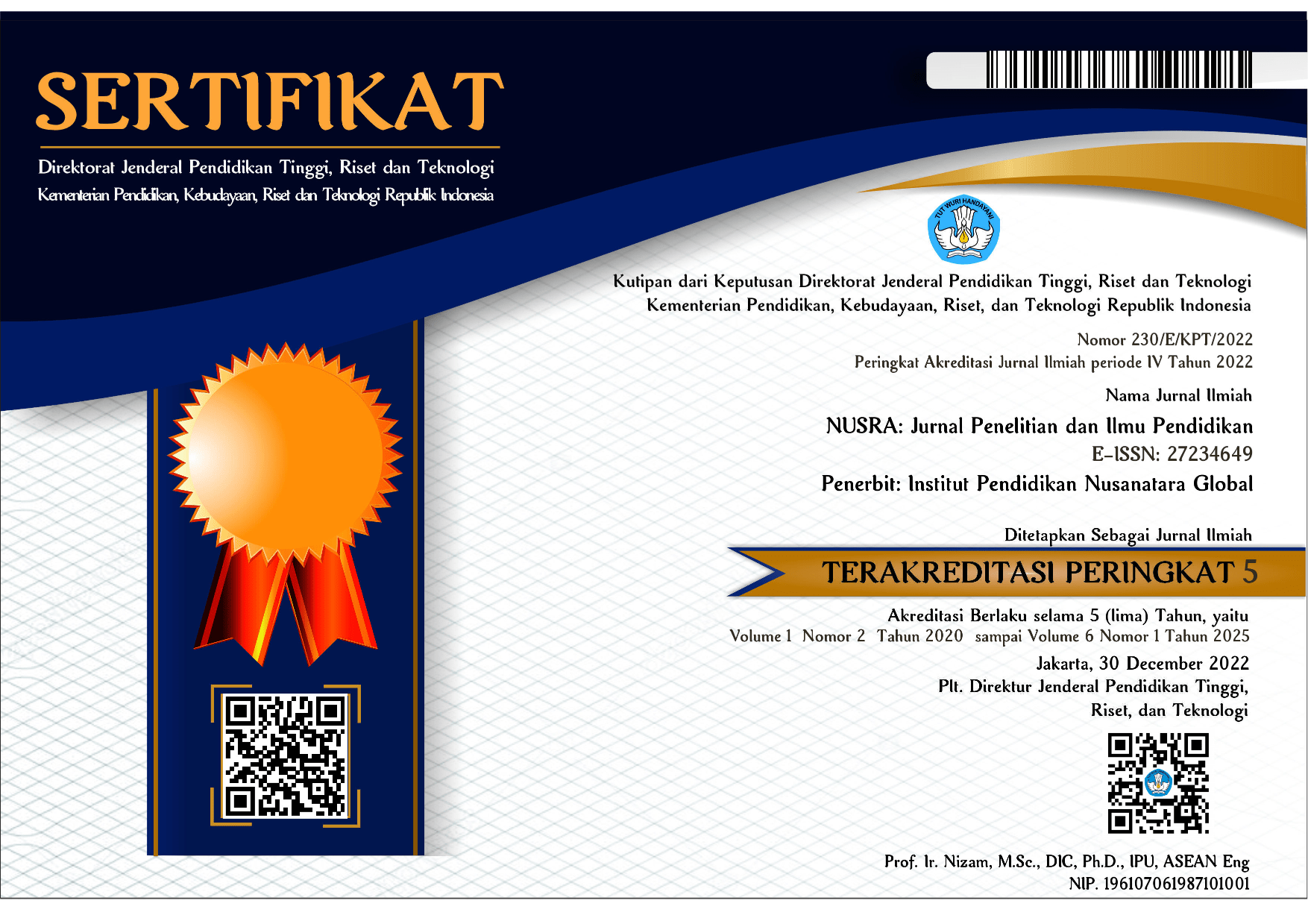Model Iklim Kelas yang Dapat Mensejahterakan Siswa Pada Tingkat Pendidikan Dasar
DOI:
https://doi.org/10.55681/nusra.v5i2.2643Keywords:
Class Climate Model, Primary School, Students’ Well-BeingAbstract
The students’ well-being is an educational issue that has recently received great attention from various parties, be they academicians, politicians, and policymakers. This research aimed to test the role of classroom climate in enhancing students’ well-being. A correlational study in our work revealed that overall, among a sample of 300 grade V and grade VI students in elementary schools and madrasah ibtidaiyah in Praya Lombok Tengah, classroom climate positively and significantly predicted students’ well-being. The classroom climate promoted students’ well being particularly when it took shape via task orientation and when it encouraged solidarity, cooperation, and involvement among students, as well as the perceived teacher justice. Aspects of classroom climate which were suboptimal in explaining students’ well-being included teacher support and learning inquiry.
Downloads
References
Boehm, J. K., Peterson, C., Kivimaki, M., & Kubzansky, L. (2011). A prospective study of positive psychological well-being and coronary heart disease. Health psychology, 30(3), 259
Chirkov, V. I., & Ryan, R. M. (2001). Parent and teacher autonomy-support in Russian and US adolescents: Common effects on well-being and academic motivation. Journal of cross-cultural psychology, 32(5), 618-635.
Cowie, H., Boardman, C., Dawkins, J., & Jennifer, D. (2004). Emotional health and well-being: A practical guide for schools. Sage.
Dariyo, A. (2017). Peran school well being dan keterlibatan akademik dengan prestasi belajar pada siswa sekolah dasar. Journal Psikogenesis, 5(1).
Dariyo, A. (2017). Peran school well being dan keterlibatan akademik dengan prestasi belajar pada siswa sekolah dasar. Journal Psikogenesis, 5(1).
Dorman, J. P. (2008). Use of multitrait-multimethod modelling to validate actual and preferred forms of the What Is Happening In this Class?(WIHIC) questionnaire. Learning Environments Research, 11, 179-193.
Fraser, B. J., McRobbie, C. J., & Fisher, D. (1996, August). Development, validation and use of personal and class forms of a new classroom environment questionnaire. In Proceedings Western Australian Institute for educational research forum (Vol. 31).
Haar, J. M., Russo, M., Suñe, A., & Ollier-Malaterre, A. (2014). Outcomes of work–life balance on job satisfaction, life satisfaction and mental health: A study across seven cultures. Journal of vocational behavior, 85(3), 361-373.
Keyes, C. L. (2013). Mental well-being: International contributions to the study of positive mental health (Vol. 8). Dordrecht: Springer.
Khatimah, H. (2015). Gambaran school well-being pada peserta didik program kelas akselerasi di SMA Negeri 8 Yogyakarta. PSIKOPEDAGOGIA Jurnal Bimbingan Dan Konseling, 4(1), 20.
Kirkcaldy, B. (Ed.). (2015). Promoting psychological wellbeing in children and families. Springer.
Konu, A., & Rimpelä, M. (2002). Well-being in schools: a conceptual model. Health promotion international, 17(1), 79-87.
Krauss, M. W., Seltzer, M. M., & Jacobson, H. T. (2005). Adults with autism living at home or in non‐family settings: positive and negative aspects of residential status. Journal of intellectual disability research, 49(2), 111-124.
Lester, L., & Cross, D. (2015). The relationship between school climate and mental and emotional wellbeing over the transition from primary to secondary school. Psychology of Well-being, 5, 1-15.
MacLeod, C., & Fraser, B. J. (2010). Development, validation and application of a modified Arabic translation of the What Is Happening In this Class?(WIHIC) questionnaire. Learning Environments Research, 13, 105-125.
Mungure, D. M. (2017). An Investigation of the teaching approach used by tutors to prepare science and mathematics teachers during training at Morogoro Teachers' College. Journal of Education and Practice, 8(6), 68-71.
Mungure, D. M. (2017). An Investigation of the Teaching Approach Used by Tutors to Prepare Science and Mathematics Teachers during Training at Morogoro Teachers' College. Journal of Education and Practice, 8(6), 68-71.
Powell, M. A., & Graham, A. (2017). Wellbeing in schools: Examining the policy–practice nexus. The Australian Educational Researcher, 44, 213-231.
Prabowo, A. (2016). Kesejahteraan psikologis remaja di sekolah. Jurnal Ilmiah Psikologi Terapan, 4(2), 246-260.
Ryan, R. (2009). Self determination theory and well being. Social Psychology, 84(822), 848.
Sellwood, P. (2009). The investigative learning process. Design & Technology Teaching, 24(1).
Soutter, A. K., Gilmore, A., & O’Steen, B. (2011). How do high school youths’ educational experiences relate to well-being? Towards a trans-disciplinary conceptualization. Journal of Happiness Studies, 12, 591-631.
Spilt, J. L., Koomen, H. M., & Thijs, J. T. (2011). Teacher wellbeing: The importance of teacher–student relationships. Educational psychology review, 23, 457-477.
Steptoe, A., O'Donnell, K., Marmot, M., & Wardle, J. (2008). Positive affect and psychosocial processes related to health. British Journal of Psychology, 99(2), 211-227.
Taggart, F., Friede, T., Weich, S., Clarke, A., Johnson, M., & Stewart-Brown, S. (2013). Cross cultural evaluation of the Warwick-Edinburgh mental well-being scale (WEMWBS)-a mixed methods study. Health and Quality of Life Outcomes, 11, 1-12.
Tennant, R., Hiller, L., Fishwick, R., Platt, S., Joseph, S., Weich, S., ... & Stewart-Brown, S. (2007). The Warwick-Edinburgh mental well-being scale (WEMWBS): development and UK validation. Health and Quality of life Outcomes, 5, 1-13.
Van Petegem, K., Aelterman, A., Van Keer, H., & Rosseel, Y. (2008). The influence of student characteristics and interpersonal teacher behaviour in the classroom on student’s wellbeing. Social indicators research, 85, 279-291.
Weare, K. (2013). Promoting mental, emotional and social health: A whole school approach. Routledge.
Downloads
Published
How to Cite
Issue
Section
License
Copyright (c) 2024 Munawir Gazali, Asrorul Azizi

This work is licensed under a Creative Commons Attribution-ShareAlike 4.0 International License.














